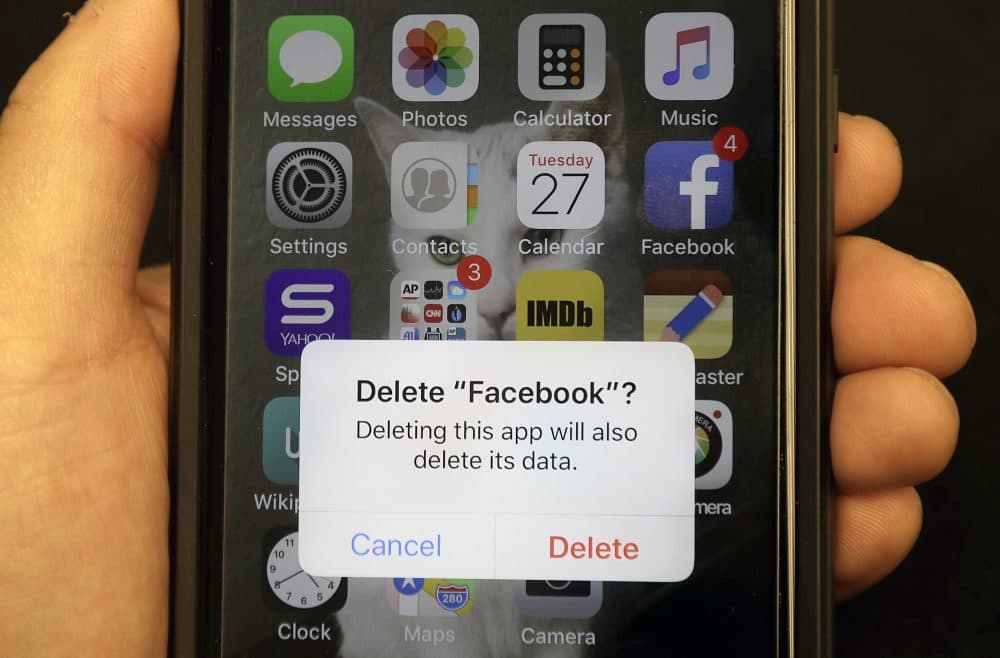Advertisement
Commentary
Deleting Facebook Will Hurt. Do It Anyway

I work in media, so I have to be “on” Facebook every day. At least, that’s how the logic goes for people in my profession. Our livelihood requires us to attract thousands of eyeballs to our work, whether it’s a video, a blog or an article like this one. We’re constantly plugging our work on platforms of digital commerce such as Facebook, Twitter, LinkedIn or even Instagram. And if just one of those platforms vanished overnight, millions of us would wake up the next morning with one urgent question: “Did we just lose our audience?”
My industry is hardly alone in being this vulnerable to an earthquake in the digital landscape. The disruption of a major social media platform could profoundly affect billions. It could upend the way many of us do business, track down information and keep in touch with our friends and loved ones.
Facebook is reeling from the revelation that Cambridge Analytica used its infrastructure to mine user data of 50 million people, potentially for the benefit of Donald Trump’s presidential campaign. Now, a growing movement of Facebook users is setting the stage for a the ultimate kind of disruption: a mass exodus from Facebook.
Go forth all you #DeleteFacebook-ers and make the most of your privilege.
It’s a thrilling and radical idea — the hollowing of the world’s biggest social media platform.
But is it a realistic or practical solution for most people?
Just as soon as the hashtag #DeleteFacebook emerged after the Cambridge Analytica scandal, a backlash against the people advocating the mass exodus also gestated. The problem with the #DeleteFacebook movement, according to Slate's April Glaser and NBC THINK’s Jillian C. York, is that it’s an inherently privileged movement. Both writers argue, compellingly, that deleting Facebook would be a self-defeating decision for Facebook users who use the platform to sustain their livelihoods, their relationships and even their mental health.
Since there’s no comparable platform to migrate to, Glaser and York reason that leaving Facebook could be tantamount to dissolving your own community. And for many of us of pressing the DELETE button would be painful.
I’m one of the trapped Facebook users whom Glaser and York are talking about, as are many of my colleagues in the media. I've wanted to delete my account for years, long before the Cambridge Analytica bombshell dropped. I'm unsettled by the fact that an algorithm decides who gets to see the content I post on Facebook. (I'm also deeply skeptical of Facebook's claim that they can't control that algorithm.)
Advertisement
But deleting my account altogether would mean dissolving an audience I've spent nearly a decade building. In just a few clicks, I'd go from having an online community of hundreds of friends and followers who might see my posted work...to having nothing. It would be like slipping into an invisibility cloak.
In theory, I should be nodding vigorously and scoffing at the privilege of the #DeleteFacebook “pioneers” who have the luxury of jumping ship without worrying about professional or personal blowback.
But I’m not. Instead, I’m nodding vigorously and hoping that the #DeleteFacebook movement grows big enough to make Mark Zuckerberg sweat through his hoodie.
Users and the data they generate are the backbone of Facebook’s business model. When both of those things start to disappear, Facebook loses money.
Here are two possible outcomes if the #DeleteFacebook movement continues to grow and if Zuckerberg’s upcoming congressional testimony backfires on the company. In the first outcome, Facebook loses most of its user base and begins to collapse. (That might sound far-fetched, but a team of Princeton researchers would beg to differ.) This would be bad for precisely the reasons that the critics of #DeleteFacebook have articulated — there are no alternatives Facebook refugees can turn to.
I'm hoping that #DeleteFacebook grows big enough to make Mark Zuckerberg sweat through his hoodie.
In the second outcome, Facebook is weakened by losing a big chunk of its users, while the public animosity towards Facebook grows powerful enough to push Congress to investigate Facebook’s monopoly power and its probable violations of antitrust laws. In this scenario, Facebook could be broken up into multiple entities, leveling the playing field for competition and making room for new entrepreneurs who want to create a better social platform. Someplace that those of us who are unhappily stuck in Zuck’s fiefdom can one day escape to. A noncommercial domain where nobody sells your data or allows political consultants to siphon it away. A place that gives its users the tools to curate and moderate the platform, Wikipedia-style.
So go forth, all you #DeleteFacebook-ers and make the most of your privilege. Take the stand so many of us can’t risk taking right now. But don’t stop there. Call your representatives and tell them what inspired you to delete your Facebook account. Use your imaginations and reach beyond the grim wisdom that Facebook will always be the dominant social network. Envision a better place for digital nomads to gather and have commerce, and do everything you can to help build and populate it.
With any luck, the rest of us can join you there.
